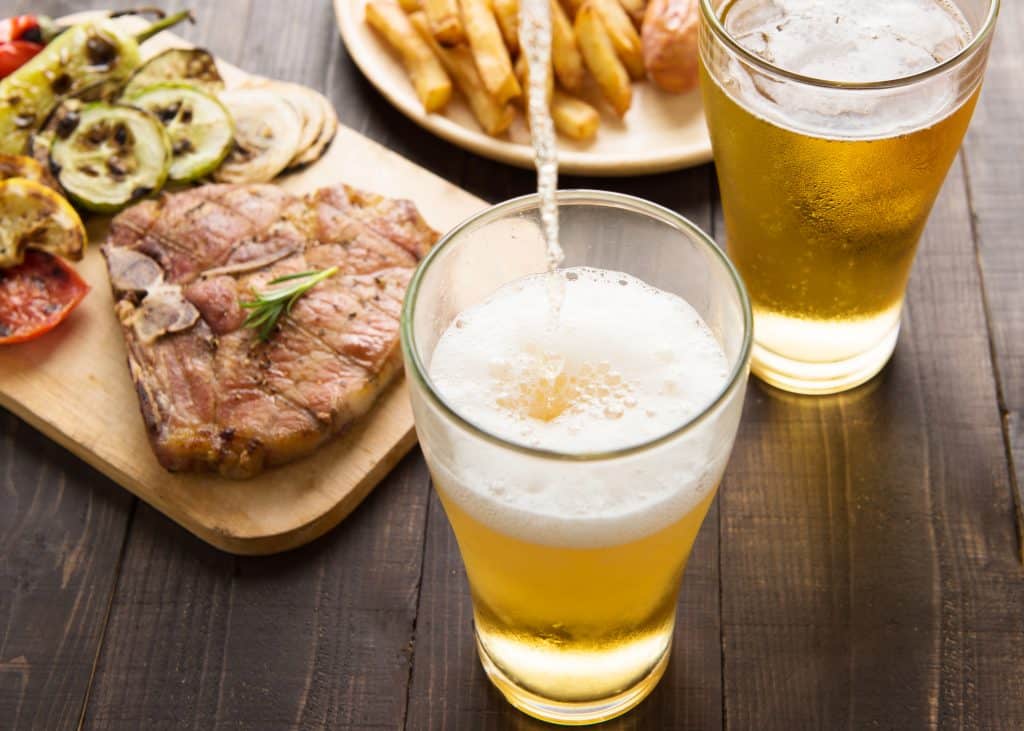Have you ever witnessed a growling sound in your belly after you chug a few beers? But why does beer make you hungry? Let’s understand a little science behind this phenomenon.
It’s hard to pass a party invitation when you have been busy all week, working hard to pay your bills. Gulping a chilled can of beer always sounds tempting. However, after downing a few drinks, your eyes suddenly start staring at the food menu. You begin to crave a large pizza when a small snack would have worked just fine to fill in your hunger strike.
Most people think that it’s just a myth, but there’s a lot more science to it than you think. According to the National Library of Medicine, “Consuming alcohol before a meal increases your food cravings.”
Well, you should be thankful to the guy who invented the term appetizers. It’s perfectly normal to enjoy a packet of crisp chips along with your pint in hand. After a binge drinking session, you’re gonna enter the starvation mode anyway. Let’s get to the bottom of this mystery to find out why beer makes you feel hungry.
Table of Contents
ToggleThe Science Behind Your Booze and Hunger
There are several factors contributing to the fact that beers make you feel hungry. You might feel temporarily full after drinking, but the truth is alcohol boosts your appetite and makes you crave unhealthy foods. Let’s dive deeper to know how beer affects our system and makes us feel hungry faster than usual.
What Does Your Brain Tell You?
In a unique study comparing mice and humans in their response to alcohol, researchers observed that alcohol activates brain cells called agouti-related protein (AgRP) neurons, which signals the body to eat.
Alcohol also triggers the release of happy hormones called Endorphins. When these wear off, cortisol (a stress hormone) is released, which makes you wanna eat a room full of snacks.
Does Beer Makes You Hungry the Next Day?
Yes, beer will make you hungry the next morning. Some people might not feel hungry till 2:00 PM in the afternoon, while others may feel like eating a whole fridge in the morning. The main reason behind the sudden empty stomach feeling is the prominent drop in blood sugar levels. Your body begins to crave salty and fried foods.
These drunk munchies can lead you to potential weight gain, says a study by Nature. The risk of obesity increases to 70% for heavy drinkers.
So, if you feel ravenous hunger the next day after a party night. It’s normal and happens to everyone. Make sure to keep healthy snacks nearby.
Is Hunger a Trigger For Alcohol?

People who are habitual drinkers might associate their hunger with alcohol. These people love to enjoy their food with a couple of beers around. According to research by Dr.Leggio and his team, the stomach produces a hormone called Ghrelin.
This hunger hormone signals your brain that you’re hungry and you should begin searching for food. The ghrelin produced also affects your alcohol cravings. So, it’s a natural thing if you feel like grabbing a beer with your burger, which, in normal situations, you would avoid.
Dehydration
Have you ever experienced the urgent need to pee while drinking beer? It’s because alcohol is a diuretic. It causes fluids to flush out from your body at a rapid rate, leaving your body dehydrated and lethargic. Sometimes, people confuse their dehydration with hunger, leading to increased consumption of junk foods rather than trying to hydrate themselves with water.
Caloric Punch
Of course, blame it all on beer. A regular beer contains 150 calories, and when you’re planning to get binge drunk-well say goodbye to your diet plans. You’ll be walking out of the bar with a high-calorie overload. According to a study published in the journal Appetite, consuming alcohol before a meal can cause a rise in hunger and a decrease in the feeling of fullness, leading to an increase in food consumption.
Alcohol can lower your inhibitions and can impair judgments, causing you to consume unhealthy foods. Before you even know it, your overeating will put you in bad shape. Beer is an alcoholic beverage, and everyone knows excessive drinking may lead to obesity.
According to a study on Science Direct published on general obesity, found that people who consumed alcohol before a meal consumed about 30% more calories than others who didn’t.
Appetite Enhancing Ingredients
Some Craft beers and specialty beers are crafted with specific ingredients like spices, salt, or savory additives that can easily stimulate your appetite.
Carbonation and hunger: The surprising link in beer consumption
Whenever you consume a carbonated drink like beer, you start feeling full after downing a few cans. The gas and bubbles create the feeling of fullness in your belly, which goes away in a few hours. As a result, you’re back in starvation mode. Carbonation may also increase your ghrelin levels, leading to an unwanted increase in appetite.
How to Curb Hunger When Drinking Alcohol
Next time you hang out with your buddies, enjoying your favorite beer, keep these useful tips in mind that will help you control your calorie intake and your appetite.
Eat Before Drinking
Avoid eating mindlessly. Before you set out to party, consume a well-balanced diet full of carbohydrates, proteins, and whole grains. If you want to enjoy a snack during your drinking session, make sure it’s a healthier option, like raw veggies, nuts, or lean proteins. This will reduce the chances of overeating large pizzas later on.
Stay Hydrated
Drink plenty of water so that you don’t confuse dehydration with hunger. Drinking water can help you fill your stomach and reduce the urge to consume excessive junk food.
Avoid Keeping Unhealthy snacks Nearby
Develop healthy eating habits. Don’t keep your favorite junk food lying near you. Opt for consuming a healthy, well-balanced diet. When you don’t find anything fatty or fried around you, you’ll automatically grab something rich in proteins and carbs to satisfy your hunger.
Practice Moderation
The best way to curb your hunger is to keep track of your tolerance level. This level may vary from person to person depending on their age, gender, height, BMI, and drinking habits. Excessive drinking may impair your judgment and can lead to poor food choices. Stick to a moderate amount of alcohol to help control your appetite.
Keep Track of Your Drinks
Plan ahead. Set limits for yourself before you leave for a Friday night hangout. You should be well aware of how many drinks are good for you and what your eating boundaries will be.
Distract Yourself
Keep yourself entertained. Talk to your friends or play fun games. Make creative use of your time. When you’re getting bored, your mind starts focusing on food, and you begin to devour food as a means of coping with your boredom.
Conclusion
Now you know it’s not just a myth. Beer does make you feel hungry. Your brain and body have a way of responding to your alcohol intake. Drinking alcohol may release happy hormones that make you crave one more of that unhealthy snack. Often, people don’t understand whether they wanna eat or drink or both. They mistakenly confuse dehydration due to alcohol as starvation.
In this post, we have highlighted the various tips that can help you control your appetite after a drinking session. Always keep healthy food items in your fridge and avoid calling the delivery service to order a pizza. Since beer has calories, eating junk food can make you put on extra weight. Learn to drink in moderation so that you don’t end up being Mr. Chubby Cheeks of the group.

I am a passionate beer connoisseur with a deep appreciation for the art and science of brewing. With years of experience tasting and evaluating various beers, I love to share my opinions and insights with others and I am always eager to engage in lively discussions about my favorite beverage.
















